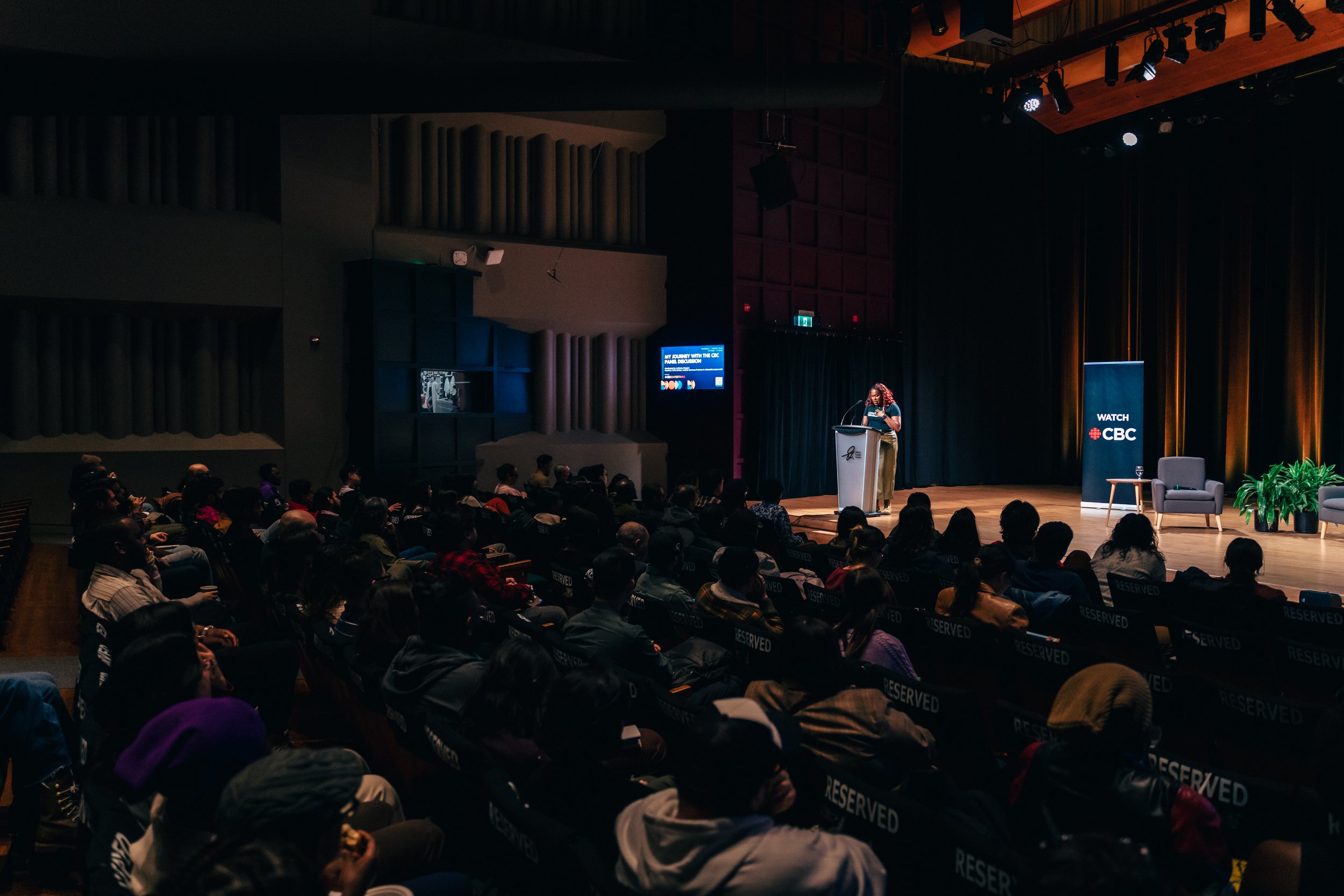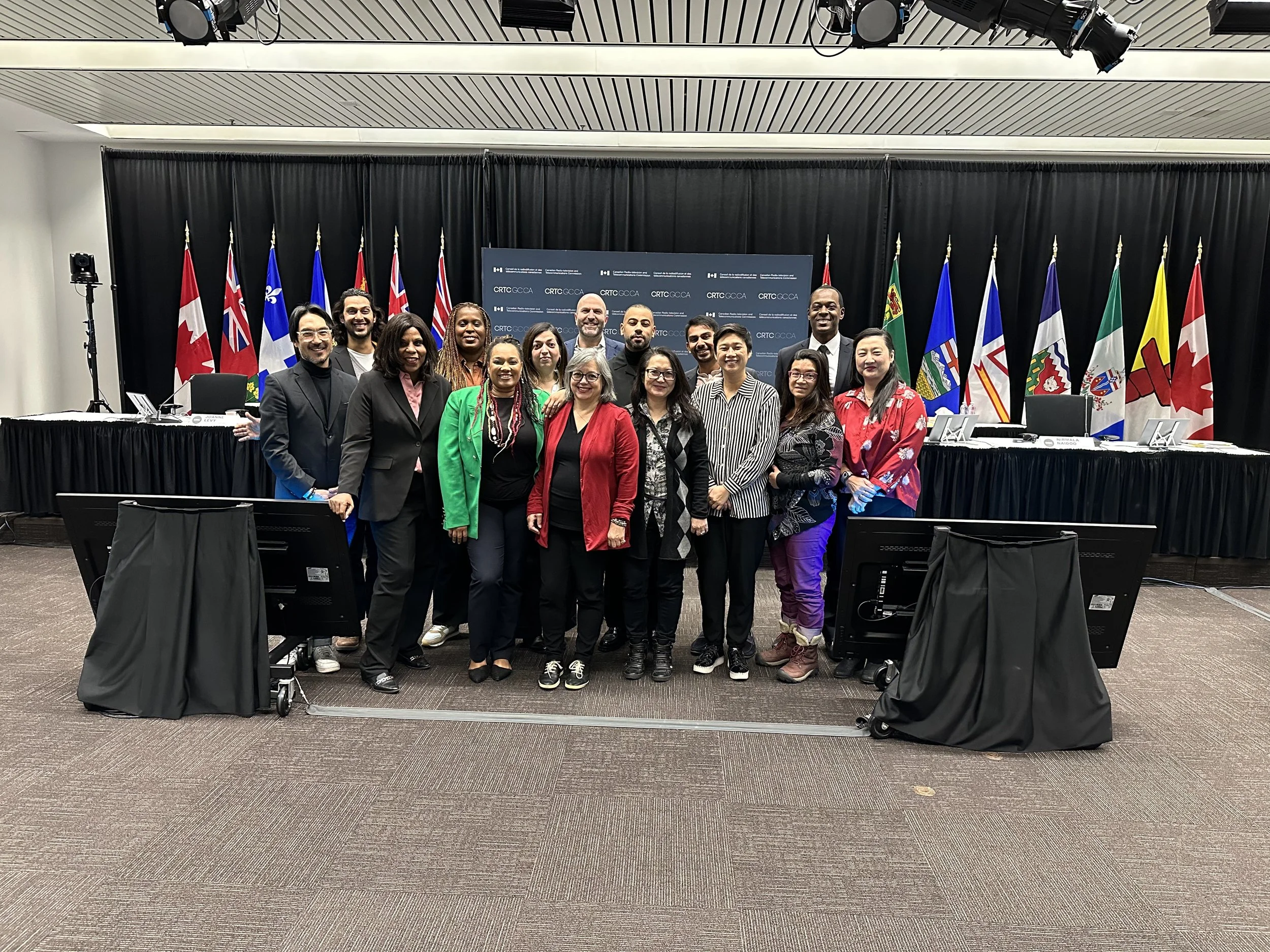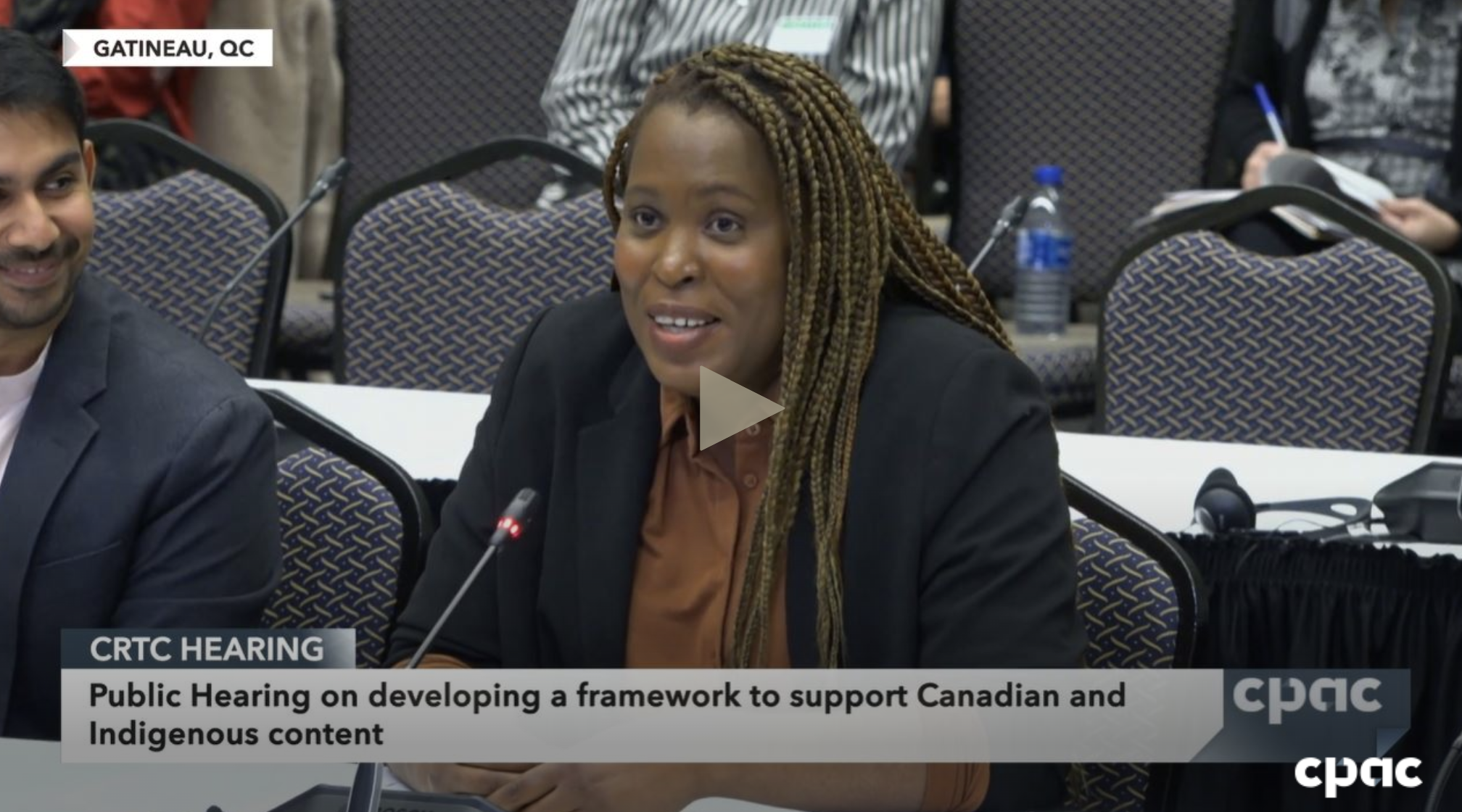
Change the Narrative
Creating a More Inclusive and Equitable Screen Sector
At BIPOC TV & Film, we are committed to creating a more inclusive and equitable screen industry by advocating for policy changes that address systemic barriers for Black, Indigenous, and People of Colour (BIPOC) creators, performers, crew, and leaders.
Our advocacy work focuses on key issues such as workforce equity, diverse content creation, equitable funding, and data transparency. We believe that a diverse and representative industry will not only enrich Canada’s cultural landscape but also strengthen its economic potential.
Through collaboration with industry partners, government agencies, and advocacy coalitions, we work to break down the structural barriers that limit the participation of BIPOC individuals across all levels of the industry. Below are the key policy priorities driving our work.
Critical Challenges in the Canadian Screen Industry
-
BIPOC creators, producers, and other professional talent remain significantly underrepresented in leadership and decision-making roles. Despite ongoing efforts to promote diversity, systemic barriers prevent many from advancing within the industry.
-
BIPOC creators often face challenges accessing development funding, business growth capital, and marketing resources, limiting their ability to fully participate and compete in the industry.
-
Current media and cultural policies do not adequately address the need for transparency and accountability around diversity targets, leading to minimal oversight of industry efforts to improve inclusion.
-
BIPOC creators and organizations are frequently excluded or fail to be meaningfully (and equitably) engaged from high-level conversations about industry policy and decision-making, limiting their influence on the rules that shape the sector. This occurs due to limited funding to support policy engagement and advocacy, lack of access to key experts and networks, and other structural barriers rooted in colonialism and discriminatory practices.
Our Policy Priorities / Proposed Solutions
-
Ensuring BIPOC professionals have equal access to leadership roles and employment opportunities in the Canadian screen industry.
The screen industry must reflect the diversity of Canada. We advocate for the adoption of mandatory diversity plans across all government-funded media projects and the inclusion of BIPOC talent in key decision-making roles. This involves not just filling quotas but building pathways for meaningful career development and leadership opportunities.
What We’re Calling For:
Mandatory equity, diversity, and inclusion (EDI) benchmarks in funding applications.
Increased funding for BIPOC-led training, mentorship, and leadership programs.
Workforce diversity reporting requirements for broadcasters and production companies.
-
Calling for race-based data collection to track progress on diversity and identify gaps in representation and inclusion.
Understanding and addressing inequities in the screen industry requires reliable data on race and ethnicity. BIPOC TV & Film is pushing for comprehensive, race-based data collection across the sector, which is crucial for tracking diversity, identifying gaps, and ensuring that progress is measurable.
What We’re Calling For:
The collection and public reporting of race-based data as a requirement for accessing federal and provincial funding.
Regular audits of diversity initiatives by key cultural agencies such as Telefilm Canada, Ontario Creates, and the Canadian Media Fund (CMF).
Transparent, accessible reporting on workforce demographics, representation in content, and media ownership.
-
Addressing disparities in financial support by advocating for dedicated funding streams and equitable resource distribution for BIPOC creators and production companies.
BIPOC creators and production companies face significant barriers in accessing the same resources as their non-BIPOC counterparts. By advocating for dedicated funding streams and capacity-building programs for BIPOC-led projects, we aim to close this gap and foster sustainable businesses in the screen sector.
What We’re Calling For:
Dedicated funding for BIPOC-led projects and companies from Telefilm Canada, the CMF, and provincial agencies.
Micro-grants and capacity-building programs for BIPOC-owned media enterprises.
Investment in BIPOC creator pipelines to ensure long-term career sustainability.
-
Promoting the production and distribution of stories by BIPOC creators that reflect Canada’s diversity.
The stories told through Canadian media shape our national identity. To build a more inclusive cultural narrative, BIPOC TV & Film advocates for stronger policies that prioritize and support the production and distribution of diverse content created by BIPOC storytellers.
What We’re Calling For:
Benchmarks for BIPOC-led projects and representation in key creative roles (e.g., directors, writers, producers) in publicly funded productions.
Government incentives for broadcasters and streaming platforms that commission and distribute BIPOC-created content.
A comprehensive review of public funding structures to ensure diverse content receives equitable support.
-
Promote greater ownership of media businesses and leadership in decision-making roles for BIPOC individuals, ensuring that power is equitably distributed within the industry.
Representation matters not only on screen but also behind the scenes. BIPOC TV & Film supports policies that promote BIPOC ownership of media companies and leadership in decision-making roles across the industry. We believe increasing BIPOC leadership will ensure a more equitable and inclusive media landscape.
What We’re Calling For:
Increased access to capital for BIPOC-owned media businesses.
Leadership development programs for BIPOC executives in the screen industry.
Advocacy for more BIPOC representation in senior roles within major broadcasters, streaming services, and production companies.
Why This Matters
A diverse and equitable screen industry is not only a moral imperative but a cultural and economic one. By amplifying BIPOC voices, stories, and leadership, we enrich Canada’s cultural landscape, create more meaningful content for audiences, and foster innovation. At BIPOC TV & Film, we are committed to making this vision a reality, and we need the support of our industry partners, policymakers, and allies to create lasting change.
How You Can Support
Advocating for equity requires a collective effort. We invite you to review our Policy Agenda and:
Partner with us in advocating for these policy changes.
Join our coalition of industry allies committed to equitable representation.
Support our programs that build pathways for BIPOC creators, crew,
Together, we can transform Canada’s screen industry into one that truly reflects our nation’s diversity.
Coalition for the Diversity of Cultural Expressions (CDCE)
In 2023, we joined the CDCE to strengthen our government relations and policy engagement and build solidarities with cultural leaders and organizations across Canada. The CDCE (founded in 1998) is a convening of influential Canadian francophone and anglophone organizations representing professionals in the cultural sector. The CDCE’s work focuses on the economic health of and the impact of digital and technological advancements on the sector and the vitality of cultural creation. Learn more about the CDCE’s mission, history and work at cdec-cdce.org.
BIPOC TV & Film at the November 2023 CRTC Hearings: The Path Forward | Watch on CPAC
-
In April 2023, The Online Streaming Act received royal assent. It is the first significant reform to the Broadcasting Act since 1991. The Government of Canada has now issued directives to the CRTC to implement the Act.
The directions give the CRTC instructions on how it will implement the Online Streaming Act, including directions designed to:
support Canadian creators and creative industries;
advance Indigenous storytelling;
increase representation of equity-seeking groups;
ensure regulations are equitable, fair and flexible;
redefine Canadian programs; and
exclude the content of social media creators, including podcasts, from regulation.
In July 2023, BIPOC TV & Film and many broadcasting sector stakeholders submitted interventions to the CRTC regarding Notice of Consultation 138, 138-1 | Read ours: PDF.
UPDATES
CRTC updates the timeline for the modernization of the Canadian broadcast sector. Next up in the CRTC’s efforts to build a new regulatory framework for the sector includes consultations on Indigenous broadcasting policy, described video and audio description, and closed captioning. In Fall 2024, the Commission will hold consultations on public interest participation and structural relationships (“the relationships between small, medium, and large players in traditional broadcasting and online streaming”) with a public hearing to follow. Highly anticipated are the consultations on definitions of Canadian audiovisual content and inclusion and diversity to “better reflect the experiences of all people in Canada and foster access to diverse voices and perspectives,” scheduled for Spring 2025 and Winter 2025-26, respectively.
A “What We heard” report will be published in Summer 2024 with feedback from the Winter 2024 cross-country engagement sessions on the definitions of Canadian content.
CRTC announces a new Indigenous Relations team to better serve Indigenous Peoples and improve its policy development and engagement.
IN THE NEWS | MEDIA MENTIONS
-
In this in-depth article by Soraya Roberts for The Walrus, BIPOC TV & Film founder, Nathalie Younglai, and executive director, Kadon Douglas, weigh in on the limitations and challenges of being a Racialized creator in Canada’s screen industry. “I just don’t want people to always be told, ‘You can do the smaller thing,’” says Younglai. “‘You can do YouTube.’ Why? Why do we have to be relegated to that when we have huge, full, epic stories to tell?”
-
EXCERPT: Telefilm Canada has announced it will form an Authentic Storytelling subcommittee in the wake of a “harmful comment” made during a Canadian Screen Awards acceptance speech earlier this month.
The subcommittee will “establish an industry standard and best practices for what is a meaningful level of understanding and engagement with a community to tell their story respectfully and authentically,” a spokesperson for Telefilm told Playback Daily.
The work will take cues from existing studies and guidelines, including the On-Screen Protocols and Pathways guideline on narrative sovereignty, commissioned by the imagineNATIVE Film + Media Arts Festival, and the Being Seen report from the Black Screen Office (BSO).
As part of the announcement, Telefilm shared a statement on the controversial acceptance speech from Oscar Peterson: Black + White director Barry Avrich on April 4, during Canadian Screen Week, where he stated “it doesn’t matter who tells [Black stories].”
“Telefilm would like to take this opportunity to oppose the harmful comment that was made during Canadian Screen Week,” read the statement. “It does matter where stories come from, who tells them, and how. Telefilm also supports the organizations that spoke up against the remarks. While Telefilm shared its support directly with these organizations, we recognize the importance of making these statements publicly.”
A joint letter from nearly 20 organizations such as BIPOC TV & Film, the Reelworld Screen Institute and the BSO was sent to the Academy of Canadian Canada & Television on April 7, stating the speech was “unacceptable, retraumatizing and harmful.” The organizations called for the industry to utilize standards around narrative sovereignty for First Nations, Inuit and Métis Peoples for stories around racialized individuals.
-
The confidential self-identification survey is tied to the opening of applications for Production programs, and will be used to further develop initiatives and programs relating to underrepresented communities.
The survey was developed in consultation with industry representatives from more than 20 organizations who comprise Telefilm’s external data subcommittee and the Diversity and Inclusion Working Group.
Industry members involved include BIPOC TV & Film, Black Screen Office, Indigenous Screen Office, Racial Equity Media Collective, Reelworld Film Festival and Toronto Reel Asian International Film Festival, as well as representatives from unions and guilds including ACTRA, Directors Guild of Canada and Writers Guild of Canada. Read more
-
“I hope seeing these numbers is a wake-up call to the entire industry that Black women, Indigenous women and Women of Colour are consistently being left behind. Gender equity cannot be celebrated when we are shut out of key creative roles,” Nathalie Younglai, founder of BIPOC TV & Film, said in a statement as the Women in View 2021 study was released. “We need to keep pushing for real change that is inclusive, equitable and intersectional. Even if it means those in power have to step aside to make room for those of us who have been historically excluded for so long,” Younglai added. Read full article at hollywoodreporter.com.
-
While industry organizations have been vocal about support for Black, Indigenous and people of colour (BIPOC) colleagues in the months since, those currently working in Canadian TV aren’t necessarily seeing results with industry gatekeepers.
“I’ve yet to see the reckoning happen from within,” said Coroner writer and executive producer Noelle Carbone during BIPOC TV & Film’s Meanwhile in Canadian TV panel and town hall on Wednesday (May 5). “Every time change has been made it’s been because someone in a vulnerable position came forward… then there’s a groundswell of voices of people on social media outside of that room or that show saying it’s unacceptable.”
The panel and town hall was created to give BIPOC, disabled and LGBTQ+ members of the industry a safe space to break their silence on exclusionary practices. It was moderated by Radheyan Simonpillai, NOW Magazine film critic and culture editor, with panelists Carbone; Deaf performing artist Natasha Bacchus (21 Black Futures); Rainy Storm Productions co-CEO and Playback 10 to Watch alum Ryan Cooper; Overlord and the Underwoods creator and showrunner Anthony Q. Farrell, and JANN writer JP Larocque. Read more at playbackonline.ca.
-
Under a proposal submitted to Canadian Heritage, the Canadian Independent Screen Fund has requested $10 million annually over five years to support BPOC (Black and People of Colour) creators. Read more at playbackonline.ca.
A coalition of industry leaders are collaborating to revive the Canadian Independent Film and Video Fund (CIFVF), a development and production fund that ran from 1991 until 2008.
Under the new name of The Canadian Independent Screen Fund (CISF), the repurposed and rebranded fund – which is still at the proposal stage – would provide development and production funding for industry professionals at the emerging, mid-career and established level.
Key leaders from BIPOC TV & Film, Racial Equity Media Collective, IMPACT, Black Screen Office Group, the Indigenous Screen Office (ISO), the National Screen Institute (NSI), BlackWomenFilm! Canada, Being Black in Halifax and Reelworld Screen Institute have all put their names to the proposal, which has been submitted to Minister of Canadian Heritage Steven Guilbeault.
-
While Telefilm didn't provide data on how funding was allocated to BIPOC and other underrepresented groups, it vowed to review its decision-making and financing models. Read more at playbackonline.ca.
“We appreciate [Telefilm's] reply and are not surprised by the dismal numbers,” said a statement from founder Nathalie Younglai. “Telefilm’s response is indicative of why they need BIPOC-led organizations and people with an understanding of systemic racism to break down the data.”
The release of the funding data came five days after filmmaker Pavan Moondi (Sundowners, Diamond Tongues) ignited a social media storm when he took to Twitter to share a rejection letter he received for a funding application, and called for greater transparency in how Telefilm’s funding decisions are made.
Among a number of issues raised was the involvement of “outside readers” – anonymous individuals who assess and give feedback on projects to Telefilm staffers – and whether there should be more transparency about who these readers are.
-
“We can't start with a clean slate until the past is acknowledged, addressed and redressed. We are in a time when the world is in a collective raising of consciousness, where the industry is finally acknowledging that racism and systemic racism exists, where both individuals and institutions are being called on to change. Let's keep the momentum going.” — Nathalie Younglai, founder, via CBC ARTS.
-
Founder Nathalie Younglai and communications and outreach lead Gillian Muller on their work to reduce barriers for BIPOC creatives and the impact of receiving support from the top. Read more at playbackonline.ca.
The grassroots organization has been around since 2012. It was founded by Younglai so Black, Indigenous and other creatives of diverse backgrounds could connect within the industry and receive mentorship and training opportunities. The Canadian Academy awarded Younglai with the Humanitarian Award this year for her ongoing efforts – and as the industry comes to terms with the problem of systemic racism, the calls and emails have been non-stop.
-
The guild says it will approach the CMPA about changing the definition of story coordinator in its existing IPA weeks after a petition from BIPOC TV & Film was launched. Read more at playbackonline.ca.
BIPOC TV & Film founder and CEO Nathalie Younglai released a statement to “applaud the WGC’s reversal in tone,” while adding that “it shouldn’t have taken days of lobbying, emailing, tweeting and phone calls to top brass for its members to be heard.”
“BIPOC TV & Film’s petition started because Gillian Müller refused to accept ‘no to equality’ for an answer and story coordinator Keavy Lynch was instrumental in building the momentum,” said Younglai. “We appreciate and are encouraged by this new sense of collaboration from WGC leadership, as that is how the best writing rooms operate.”








“For a country that prides itself on being welcoming to foreigners, the entertainment industry often fails to integrate the talents and experiences of immigrant professionals, specifically those who are new to the country.” - Written by guest contributor Leandro Matos